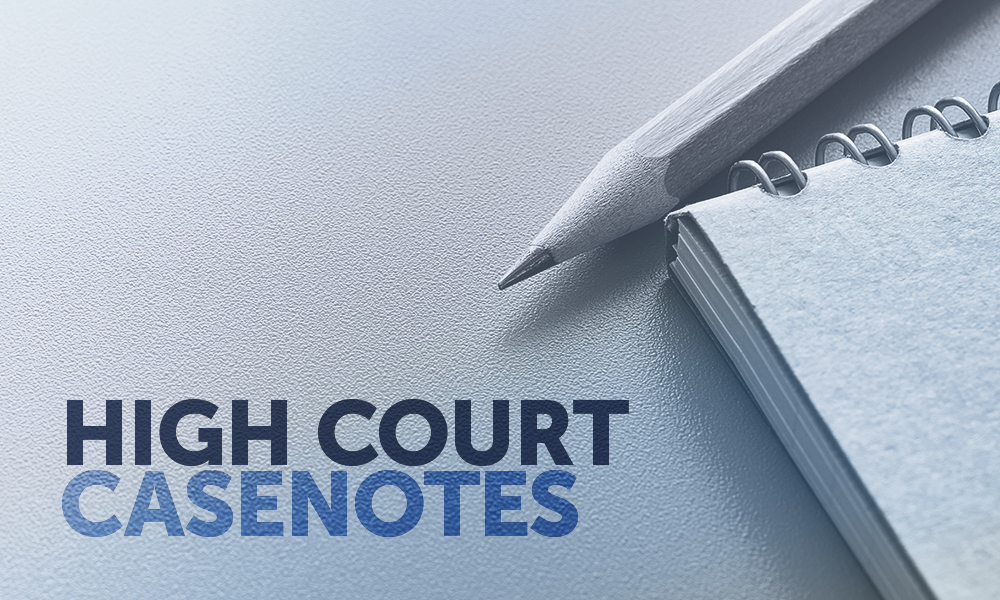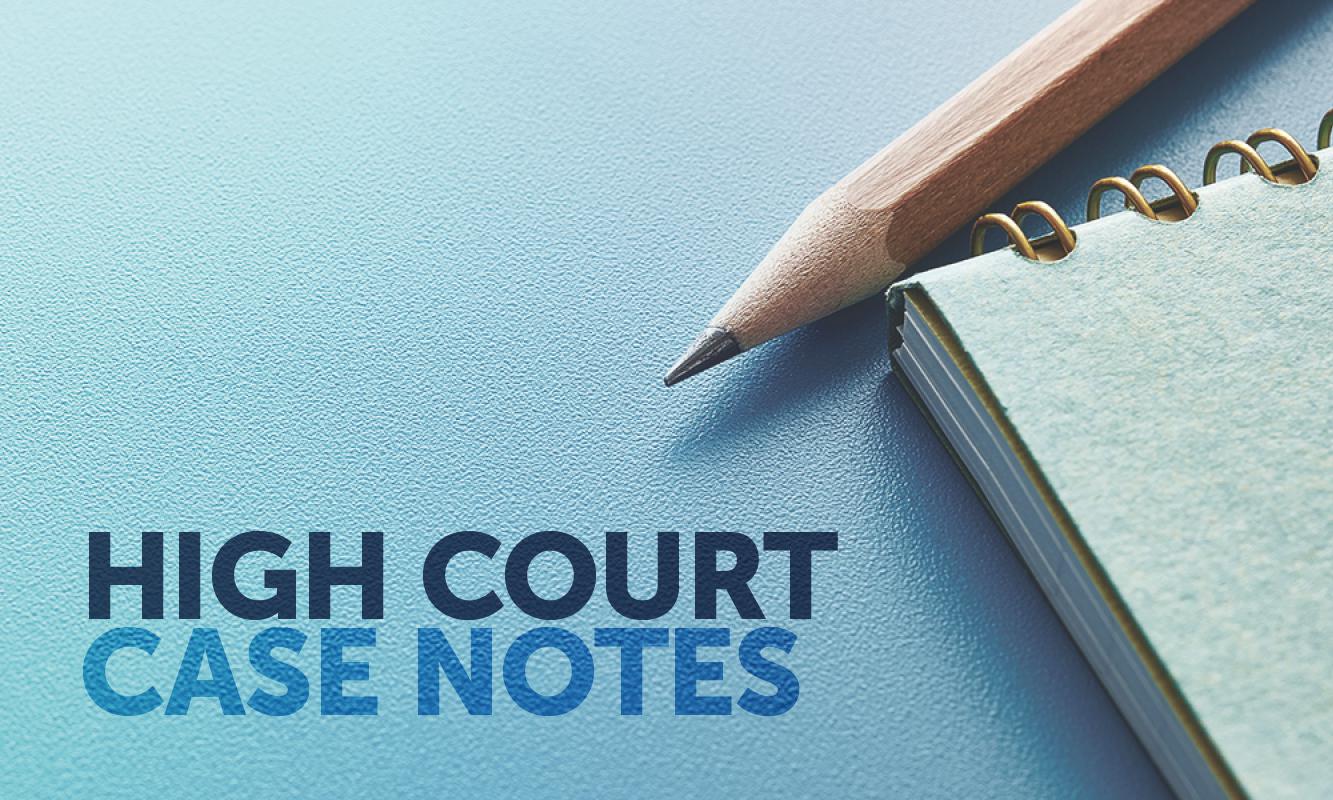In Palmer v Western Australia [2021] HCA 5 (24 February 2021) the High Court was required to consider whether the Quarantine (Closing the Border) Directions (WA) (Directions), which effectively closed the West Australian border from 5 April 2020, infringed s92 of the Constitution.
The Police Commissioner for Western Australia issued the Directions under s67 of the Emergency Management Act 2005 (WA) (the Act). Section 67 allows an authorised officer to (among other things) “direct or, by direction, prohibit, the movement of persons … into, out of or around an emergency area or any part of the emergency area” during a state of emergency for the purpose of “emergncy management”.
A Minister may declare a state of emergency under s56 of the Act provided that the conditions enumerated under s56(2) are met. The Minister declared a state of emergency under the Act on 15 March 2020 (after the World Health Organisation declared COVID-19 a pandemic).
The challenge to the Directions was brought by Clive Palmer (Palmer) and Mineralogy Pty Ltd, a company of which Palmer is chairman and managing director (the plaintiffs). Palmer regularly travelled between WA and his home in Queensland for business purposes. Palmer applied for, and was denied, an exemption under the Directions.
The plaintiffs subsequently brought proceedings in the original jurisdiction of the High Court, in May 2020, seeking a declaration that “either the authorising Act and/or the Directions are invalid, either wholly or in part … by reason of s92 of the Constitution”. Section 92 of the Constitution provides, relevantly, “trade, commerce and intercourse among the States … shall be absolutely free”.
The plaintiffs argued that the Directions imposed a burden on the freedom of intercourse among the Australian people by prohibiting cross-border movement of people. Alternatively, the plaintiffs argued that the freedom of trade and commerce guaranteed by s92 is contravened because the Directions imposed an effectively discriminatory burden with protectionist effect.
The defendants (the State of Western Australia and the Police Commissioner) denied that either the Act or the Directions contravened s92 because, they argued, neither had the purpose of economically protecting Western Australia, rather they had the legitimate purpose of (and were reasonably necessary to achieve) the protection of the population of Western Australia against risks arising from emergency situations.
No agreement could be reached between the parties on the facts necessary to determine the plaintiffs’ claim by the High Court. Accordingly, the High Court remitted the issue to the Federal Court of Australia for hearing and determination pursuant to s44 of the Judiciary Act 1903 (Cth).
On 25 August 2020, Rangiah J of the Federal Court found that the facts pleaded by the defendants, in support of their argument that the Directions did not infringe s92, had been proved. Importantly, Rangiah J held that the risk to the health of the West Australia population was a function of two factors: the probability that COVID-19 would be imported into the population and the seriousness of the consequences if it was imported.
Rangiah J concluded that, given the uncertainties about importation of the disease into Western Australia and the potentially serious consequences of the disease, “a precautionary approach should be taken to decision-making about the measures required for the protection of the community” (see [23]).
The High Court unanimously (but in separate reasons) rejected the plaintiffs’ challenge to the Directions. As Gageler observed at [83], “The riddle ‘riddle of s92’ lies in the question begged by the constitutional text: ‘absolutely free from what?’” Citing Cole v Whitfield (1988) 165 CLR 360 at 394 and 398, Gageler J notes at [85] that it has been authoritatively determined that trade and commerce among the states is guaranteed by s92 to be absolutely free from “discriminatory burdens of a protectionist kind”.
As to what amounts to discrimination, in joint reasons, Keifel CJ and Keane J explain at [31], “Discrimination in a legal sense involves a comparison of relative equals by which one is treated unequally, or of unequals treated equally”.
The High Court was unanimous in finding that the Directions were discriminatory but did not infringe s92 because it was justified to protect the population of Western Australia from COVID-19. But where their Honours parted company was the test adopted to determine this justification.
Kiefel CJ and Keane J and, in a separate judgment Edelman J, held that the proper test was the “structured proportionality test” – a rigid test involving three distinct steps (see [269]-[276]). Conversely, Gageler and Gordon JJ, in separate judgments, considered that the proper test for justification was “reasonable necessity”. The test involves an evaluative judgment as to the suitability and necessity of the legislation imposing the burden.
Dr Michelle Sharpe is a Victorian barrister practising in general commercial, real property, disciplinary and regulatory law, 03 9225 8722, email msharpe@vicbar.com.au. The full version of these judgments can be found at austlii.edu.au.














4 Responses
Should there be “burden of proof” showing scientific proof of isolation of the “virus” beyond reasonable doubt. Just curious
Yes this should have been the very core of the issue at hand. To date no-one has produced any evidence whatsoever that such a virus even exists in fact the opposite has been the case that the scientists that have come forward have proven that there is no virus and that the whole thing is purely contrived out of nothing to bring the world to a stand still for the development of globalism. These people who claim to sit for justice are not fit to sit in the chair.
This is nonsense: these “judges” study law for decades yet cannot even interpret a plain English sentence.
Section 92 states
” … and intercourse among the States, … shall be absolutely free”.
1. This is not just about goods, it is about people too.
2.”intercourse shall be absolutely free”, in other words “movement shall be absolutely free”
Why are these “justices” (sic) questioning “freedom from what?”
The constitution does not qualify or quantify “free”: it is absolute freedom!
And nothing to do with “reasonable” either.
Free means free: unhindered, unfettered, always, reasonable ot not.
These judges should be elected by the people instead of having a lifetime tenure.
It was my understand the the case was based on Section 92 of the Commonwealth Constitution; and not covid 19. I don’t believe the High Court Judges had any lawful jurisdiction to apply a “what if” scenario to Section 92 of the Commonwealth Constitution, or change its definition without referendum. That is exactly what they did; they applied a new definition to Section 92 without any authority. If they added a new definition to the Constitution. Then the burden of proof was upon the Judges to provide evidence that Mr Palmers actions would cause their new definition to happen. Its become a “Kangaroo Court” when judges can just make stuff up to suit their agendas without being held to the same accountability as every other man, woman and child. Doesn’t the law say: the burden of proof is on the individual making the accusation?